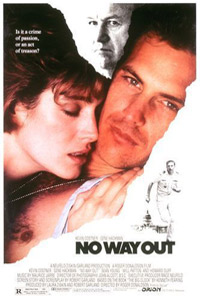 Kevin
Costner (The Untouchables,
American Flyers) stars as Lt. Cmdr. Tom
Farrell, who, while at a party, meets Susan Atwell (Young,
Blade Runner), an attractive woman that he
ends up having a romantic affair with. Though the two profess more than
just lustful desires, they cannot quite become an item yet, as Atwell happens
to also be the mistress of Defense Secretary David Brice (Hackman,
Superman IV), who isn't likely to let go so
easily. One fateful evening, Atwell and Brice have a heated argument,
which ends up resulting in Atwell's accidental death at Brice's hands.
After Brice remembers another man at the scene (in fact, it was Farrell,
though it was too dark for Brice to know), he decides to launch a full-scale
investigation in an effort to cover up his involvement in Atwell's death.
At the behest of Brice's faithful assistant, Scott Pritchard (Patton,
The Postman), they decide that the rumored mole
in the military, code-named "Yuri", is to be the one blamed for the deed.
In a bit of irony, Farrell is chosen to head up the investigation, though
every piece of evidence that comes up seems to point to himself as the man on
the scene on the night in question.
Kevin
Costner (The Untouchables,
American Flyers) stars as Lt. Cmdr. Tom
Farrell, who, while at a party, meets Susan Atwell (Young,
Blade Runner), an attractive woman that he
ends up having a romantic affair with. Though the two profess more than
just lustful desires, they cannot quite become an item yet, as Atwell happens
to also be the mistress of Defense Secretary David Brice (Hackman,
Superman IV), who isn't likely to let go so
easily. One fateful evening, Atwell and Brice have a heated argument,
which ends up resulting in Atwell's accidental death at Brice's hands.
After Brice remembers another man at the scene (in fact, it was Farrell,
though it was too dark for Brice to know), he decides to launch a full-scale
investigation in an effort to cover up his involvement in Atwell's death.
At the behest of Brice's faithful assistant, Scott Pritchard (Patton,
The Postman), they decide that the rumored mole
in the military, code-named "Yuri", is to be the one blamed for the deed.
In a bit of irony, Farrell is chosen to head up the investigation, though
every piece of evidence that comes up seems to point to himself as the man on
the scene on the night in question.
No Way Out may have plot holes that would sink most other thrillers of
its ilk, but thanks to the the energy created by Donaldson's (The
Bounty, Cocktail) direction and Costner's
entertaining "everyman" performance, it still manages to properly engage from
beginning to end for all lovers of tightly-wound thrillers. Part of the
reason the film engages is due to its clever plot device of having the
protagonist try to keep himself from getting the blame for the deed, despite
knowing that everything the investigative unit turns up will only be one more
nail in his proverbial coffin. The other major twist is that he knows
full well the identity of the real killer, although, for reasons that are
clear within the film, he cannot point the finger at without exposing too much
of himself in the process. This plot device is perhaps the only element
actually extracted from the credited novel the film is based on, Kenneth
Fearing's 1946 book, "The Big Clock", which was also previously made into a
film in 1948.
Though many will feel that the film's ending, a very ambitious twist that some
claim undermines everything that comes before, is superfluous and confusing,
by the time it arrives, the entertainment quotient has already been met in
order to call the film worthwhile. Personally speaking, while others
have knocked the final twist, I actually think it's refreshingly diabolical.
This is, after all, not a film about power, government, or the Cold War, as
some people have wrongly assumed. It's nothing more than an exploration
in genre technique; playing the audience is its main goal. The
unexpected twist only confirms the intent of the creators on making it a
mystery, and not the political thriller it had been marketed as.
No Way Out is the best kind of implausible thriller -- tense, fluid,
and never lingers long enough to call it out as a crock. Only the bland
soundtrack (featuring a couple of terrible new songs by Paul Anka) and synthy
score (from Academy Award winner Maurice Jarre (Dreamscape,
Top Secret!) , no less) mars my overall
enjoyment. One of Costner's best performances, and also one of his most
overlooked films.

